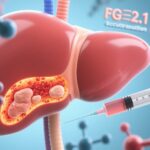Highlights
- Tulisokibart, an anti-TL1A monoclonal antibody, demonstrates endoscopic and clinical efficacy in phase 2 trials for both Crohn’s disease and ulcerative colitis refractory to standard therapies.
- In Crohn’s disease, 26% achieved endoscopic response at week 12; in ulcerative colitis, clinical remission was significantly higher with tulisokibart versus placebo (26% vs. 1%).
- Safety profile was favorable, with most adverse events mild to moderate and no deaths reported.
- Ongoing phase 3 trials will further assess long-term efficacy and safety.
Clinical Background and Disease Burden
Inflammatory bowel diseases (IBD), including Crohn’s disease and ulcerative colitis, are chronic, relapsing-remitting disorders characterized by intestinal inflammation, with significant impact on quality of life and substantial healthcare costs. Despite advances in biologic therapies—such as anti-TNF, anti-integrin, and anti-IL-12/23 agents—a significant proportion of patients experience primary nonresponse, secondary loss of response, or intolerance, highlighting an unmet need for novel mechanisms of action, particularly for those with moderate-to-severe, refractory disease.
TNF-like cytokine 1A (TL1A) has emerged as a pivotal mediator in the pathogenesis of IBD, implicated in both inflammation and fibrosis. Targeting TL1A offers a new therapeutic strategy distinct from other biologic classes.
Research Methodology
Crohn’s Disease: APOLLO-CD Phase 2a Study
A multicenter, open-label, phase 2a trial (APOLLO-CD) evaluated tulisokibart in adults (≥18 years) with moderately to severely active Crohn’s disease (CDAI 220–450; SES-CD ≥6 for ileocolonic/colonic or ≥4 for isolated ileal disease), all with inadequate response, loss of response, or intolerance to conventional or approved biologic therapies. Participants received intravenous tulisokibart (1000 mg on day 1, then 500 mg at weeks 2, 6, and 10).
Primary endpoints were safety and endoscopic response at week 12 (≥50% decrease in SES-CD from baseline). Safety was analyzed in all treated patients, while efficacy was assessed per protocol (excluding major deviations). The trial was registered at ClinicalTrials.gov (NCT05013905).
Ulcerative Colitis: ARTEMIS-UC Phase 2 Trial
A randomized, double-blind, placebo-controlled phase 2 trial enrolled patients with moderate-to-severe ulcerative colitis and glucocorticoid dependence or failure of prior therapies. Patients received intravenous tulisokibart (1000 mg day 1, then 500 mg at weeks 2, 6, and 10) or placebo. Cohort 1 included all-comers; cohort 2 included only those with a positive predictive biomarker for response. The primary endpoint was clinical remission at week 12. Prespecified analyses combined biomarker-positive patients from both cohorts. ARTEMIS-UC is registered at ClinicalTrials.gov (NCT04996797).
Key Findings
Crohn’s Disease (APOLLO-CD)
– 55 eligible patients enrolled; mean age 39.1 years, 62% male, 71% with prior biologic exposure.
– At week 12, 13 of 50 per-protocol patients (26% [95% CI 15.9–39.6]) achieved endoscopic response.
– Adverse events occurred in 78% (43/55), mostly mild/moderate. Most common: COVID-19 (11%), UTI (9%), Crohn’s flare (9%), anemia (7%), nasopharyngitis (5%), fatigue (5%). Serious adverse events in 15%, none drug-related. No deaths.
Ulcerative Colitis (ARTEMIS-UC)
– In cohort 1 (n=135), clinical remission at week 12 occurred in 26% on tulisokibart vs. 1% on placebo (difference 25%, 95% CI 14–37; P<0.001).
– Among biomarker-positive patients (n=75), remission rates were 32% with tulisokibart vs. 11% with placebo (difference 21%, 95% CI 2–38; P=0.02).
– Adverse event incidence was similar between tulisokibart and placebo; most events were mild to moderate.
Mechanistic Insights and Biological Plausibility
TL1A, part of the TNF superfamily, binds to death receptor 3 (DR3), promoting T-cell activation, intestinal inflammation, and fibrotic pathways. Preclinical models and genetic studies support a causal role in IBD pathogenesis. Tulisokibart’s mechanism—neutralizing TL1A—may address both inflammatory and fibrotic components of disease, theoretically benefiting patients unresponsive to conventional anti-inflammatory biologics.
Expert Commentary
Dr. Brian G. Feagan and Dr. Bruce E. Sands, principal investigators, highlight that tulisokibart’s efficacy in refractory IBD populations—particularly those with prior biologic failure—represents a promising advance. However, the observed response rates, while meaningful, indicate that not all patients benefit, underscoring the importance of biomarker-driven patient selection and the need for head-to-head studies against current standards.
Controversies and Limitations
– The APOLLO-CD trial was open-label and lacked a placebo comparator, potentially overestimating efficacy.
– Short-term follow-up (12 weeks) limits assessment of durability and long-term safety.
– Biomarker stratification, while promising in ARTEMIS-UC, requires further validation for clinical implementation.
– Small sample sizes and heterogeneous patient populations may affect generalizability.
Conclusion
Tulisokibart, an anti-TL1A monoclonal antibody, demonstrated potential efficacy in inducing endoscopic and clinical remission in moderately to severely active Crohn’s disease and ulcerative colitis, particularly in populations with limited therapeutic options. The safety profile was favorable, with most adverse events being mild or moderate and no deaths reported. Ongoing phase 3, randomized, placebo-controlled trials are essential to confirm these results, determine long-term outcomes, and refine patient selection strategies. Tulisokibart represents a novel mechanism that could expand the therapeutic armamentarium for IBD if future studies validate its benefit.
References
Feagan BG, Sands BE, Siegel CA, Dubinsky MC, Longman RS, Sabino J, Laurent O, Luo A, Lu J, Nguyen DD, Muñoz-Elias EJ, Llewellyn H, Wang Y, Jang I, Bilsborough J, Marchelletta R, Towfic F, Yen M, Anderson JK, DuVall A, Kierkus J, Woynarowski M, Al Kharrat H, Targan SR, McGovern DPB. Safety and efficacy of the anti-TL1A monoclonal antibody tulisokibart for Crohn’s disease: a phase 2a induction trial. Lancet Gastroenterol Hepatol. 2025 Aug;10(8):715-725. doi: 10.1016/S2468-1253(25)00071-8.
Sands BE, Feagan BG, Peyrin-Biroulet L, Danese S, Rubin DT, Laurent O, Luo A, Nguyen DD, Lu J, Yen M, Leszczyszyn J, Kempiński R, McGovern DPB, Ma C, Ritter TE, Targan S; ARTEMIS-UC Study Group. Phase 2 Trial of Anti-TL1A Monoclonal Antibody Tulisokibart for Ulcerative Colitis. N Engl J Med. 2024 Sep 26;391(12):1119-1129. doi: 10.1056/NEJMoa2314076.



